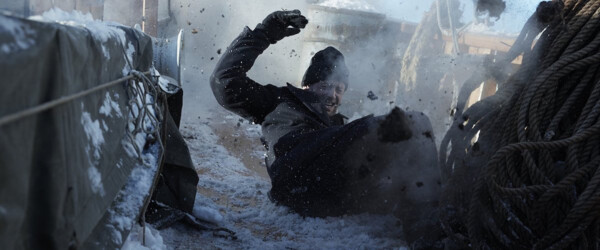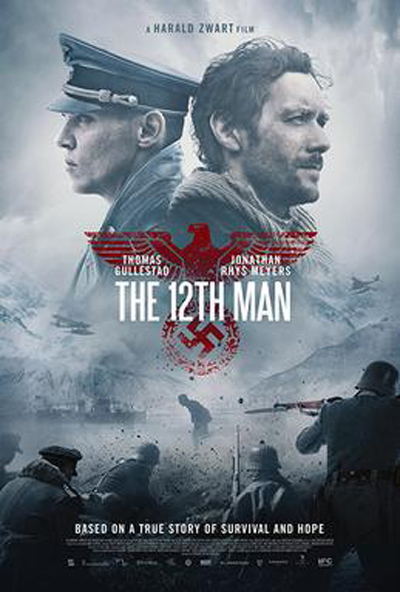Del and Mladen review ‘The 12th Man’

Image courtesy of IFC Midnight.
“The 12th Man” Starring Thomas Gullestad, Jonathan Rhys Meyers, Marie Blokhus and others. Directed by Harald Zwart. 135 minutes. Unrated. Hulu.
Del’s take
To describe a movie as “interesting” is to suggest it is not inspiring or intriguing or epic in its sweep. I think that’s a fair assessment of “The 12th Man,” an interesting movie that somehow falls short of the real events it seeks to depict.
Based on the 2001 book “Jan Baalsrud and Those Who Saved Him,” by Tore Haug and Astrid Karlsen, “The 12th Man” chronicles the action of a band of saboteurs who are captured trying to infiltrate German-occupied Norway during World War II. One man is shot on site, 10 are later executed, but a 12th man, Jan Baalsrud (Gullestad), escapes into the snowy wilderness. What follows is a harrowing tale of survival and near-misses as Baalsrud makes his way toward neutral Sweden while being pursued by obsessive Sturmbannführer Kurt Stage (Rhys Meyers).
“The 12th Man” is a testament to human strength and endurance. Baalsrud experiences gruesome deprivations during his months-long odyssey across the frozen landscape – he is shot, suffers hypothermia and frostbite, and starves while hiding from the relentless Stage. You wonder how a body could survive such abuse. For his pursuer, the stakes are equally painful. If Baalsrud succeeds in reaching Sweden, Stage’s failure will be noted in Berlin … with legendary Nazi displeasure.
The movie does a credible job of replaying the events of Baalsrud’s trek, which we are assured actually happened, with the exception of Stage’s pursuit. According to my research Stage did not pursue Baalsrud across frozen Norway. In fact, the Nazis believed Baalsrud drowned trying to swim across a fjord. Still, the major points of Baalsrud’s escape and the suffering he experienced remain intact and are, as I said, harrowing if not grotesque.
The movie is beautifully shot and makes effective use of the ice and snow as a kind of character unto itself, much the way snow and cold figured into the telling of “Let the Right One In.” I felt a sympathetic shiver as Baalsrud plunged into the chilly Arctic waters of a fjord as German soldiers and their dogs approached, or hid for days in the snow-covered swale of an icy boulder.
The stars of “The 12th Man” are not Baalsrud but the Norwegian people along the way who sacrificed all to facilitate his escape. It is they who risked everything to help a man they didn’t know, a patriot but a stranger who could not improve their lives under Nazi rule but could make things a hell of a lot worse if it became known they were harboring a fugitive.
The movie also reminds us the Nazis were evil, horrible men and women who did evil, horrible things to millions of innocent people. Given that fascism is on the ascendency and some of the former president’s more ardent and colorful admirers are fond of culling the Nazi playbook for political tips and strategies, maybe a stomach-turning dose of “The 12th Man” is just the tonic for this generation hell bent on re-discovering that tragic wheel of human misery.
My gripes with “The 12th Man” are, for starters, that it’s way too long. Two hours and 15 minutes of unrelenting tension is too much for an audience to endure. The movie also dwells to lurid excess on the details of Baalsrud’s suffering – I wanted to fast-forward through the scenes of blackened toes falling off or Baalsrud chipping his teeth through another bout of fjord-induced hypothermia.
My biggest complaint is that while the camera mostly focuses on Baalsrud, perhaps it should have been focused on the ordinary Norwegians who made his escape possible. Baalsrud does not do much except stay alive – no small thing, I admit. But it is the fishermen and trappers and villagers, the real stars of the movie I alluded to earlier, who take the action and pay the price for getting Baalsrud to Sweden. They will not have any movies made about them, but maybe they should.
Overall “The 12th Man” is a decent enough war movie about a real event. But it is too long, relishes a little too much the suffering of its protagonist and maybe doesn’t spend enough time detailing the heroics of its real heroes. Watch it on Hulu but gird yourself for a sometimes graphic marathon of pain and suffering.
Oh, and yes, it uses subtitles, if that’s an impediment for you.
I would grade it a B-.

Mladen’s take
Del and his people-are-wonderful-under-duress approach to reviewing a movie. Sheesh. Hey, Del, it was a stoolpigeon Norwegian who fingered the Norwegian commandos to the Germans. The indigenous stoolie was responsible for the deaths of the 11 saboteurs and our beloved Baalsrud’s prolonged exposure to the elements at high latitude as he fled east.
No, no. Let’s put the “The 12th Man” in context.
The film, though decent enough, is what I label “history revenge” cinematography. In Europe, the ongoing object of history revenge is Germany. Please, no misunderstandings. The Third Reich and its Hitler-driven National Socialism is among mankind’s most soulless societies. Tactically, however, the Wehrmacht right to the end of Word War II was one helluva fighting force and the Gestapo one helluva counter-spy and internal intelligence directorate. That’s what the “The 12th Man” is about. It tries to make the fact that one surviving Norwegian, who was a member of a raiding party that utterly failed to execute its mission and itself was executed, equaled a great victory for Norway against a country that occupied it from 1940 to 1945. What nonsense.
Europe today is far from the savage bundle of countries that colonized the globe and annihilated or oppressed cultures, ethnicities, languages, or sustainable economic systems from Africa to Asia to both Americas. The EU, the euro zone, and NATO have rendered Europe less blindingly feudal, fascistic, or mercantilist. But, all those countries that had their asses kicked by Germany between 1938 and 1945 still hold grudges.
“The 12th Man” is a manifestation of the history revenge grudge from the Norwegian perspective like 2013’s very good “Battle of Westerplatte” reflects Polish and Lithuanian history revenge. What would happen to you if you started taking about the history of Vichy France in Paris today? Your escargot would come laced with arsenic. Hell, the Russians, who obliterated Hitler’s Germany, still talk, write, sing, and make TV series and movies about the Great Patriotic War as though it happened yesterday.
We must never forget World War II, but we have to be careful of believing the way it’s portrayed in films, documentaries, fiction literature, and partisan interpretations of events. There were good guys and bad guys on the Allied and Axis sides, though some were worse than others. Norway had its share of Nazi sympathizers and straight-up fascist politicians. The continuum of World War II injustices must be understood and illuminated to withstand the diabolical revision of history that is easily spread through the internet and entertainment media.
Kicking aside my infallible law of history revenge as it applies to nationalistic re-interpretation of events long ago to look at the merits of “The 12th Man” without context, I give the film a C+.
It shouldn’t take you long to see that the movie’s producers and director (as well as the book on which the movie is based) tried to transform a lemon of a commando raid into lemonade even if you’re unaware of the geopolitics of World War II. Twelve men were sent to help the allies and one lived, an 8 percent rate of survival. What would have happened if only 8 percent of the Yanks, Tommys, and whatever the nickname for Canadian soldiers storming five beaches in 1944 Normandy lived? Uh huh. Also, most of the “The 12th Man” depicts Baalsrud trying to stay alive while running and hiding and hiding and running from Germans. He made no effort to continue the mission, explode Luftwaffe aerodromes, or stick around to use his training to help Norwegian resistance fighters.
Look, the saboteurs had balls, but in the movie as in real life, they had their balls shot off. One of them surviving with his balls intact, though a few of his toes on the right foot did not, was not a victory for Norway. It was a moment of triumph of the will for a very, very limited number of individuals. “The 12th Man” would have served better as a microcosm of a story showing us the determination and grit by the people we saw in the movie and got to know, rather than trying to convince me that their effort helped all of Norway and its millions of people endure occupation. A more disciplined, less holistic “The 12th Man” might have also allowed some 25 minutes to 30 minutes of the film to be cut.
“The 12th Man” is worth watching. The austere beauty of fjords, mountains, and snow near the Arctic circle is captured nicely in the film. There’s good acting. The women are all lookers. But, I’m no chump. There’s no way that one soldier surviving a busted mission improved life in a country overrun by a conquering army.
Mladen Rudman is a former journalist and technical writer. Del Stone Jr. is a former journalist and author.
![]()
Leave a Reply